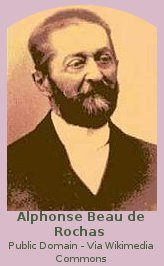Human Intelligence Requires Accurate Thinking
To Uncover Nature's Secrets
Part 23 - Part 22
Understanding Pays Dividends
Human Intelligence was more widely consulted in the fledgling Internal Combustion Engine Industry, than it was in early Aviation. Although not particularly accurately.
Numerous
active minds were occupied in various undertakings to comprehend the
concept of Internal Combustion in it's differing forms. However, things
did not advance significantly until the Four Stroke Cycle was introduced by Nikolaus August Otto who held overarching Patents on the process, and is generally believed to be it's inventor.
The
Four Stroke Cycle, or rarely called, Otto Cycle, is the basis of the
smooth, powerful, and quiet Engine, you most likely have in your
vehicle. Whether it be powered by Petrol or Diesel.
The alternative Two Stroke configuration, which actually produces a greater power output for a given engine displacement, is all but obsolete. Mainly for Environmental reasons.
All Important Contribution
French born Engineer, Alphonse Beau de Rochas, (1815-1893) held a Patent on the Four Stroke Cycle some fourteen years prior to Otto obtaining his.

Although Alphonse Beau de Rochas never did build an engine, his all
important contribution to the eventual success of the Internal
Combustion Engine was a Scientific description of the Four Stroke Cycle,
which addressed serious shortcomings in the Contrivances then being
built.
Years later, in recognition of his contribution to
Science, Alphonse was awarded two sums totaling five thousand francs
along with a pension of 500 francs. The World would be a better place if
there were more recognition such as this.
Even though Beau de
Rochas had spelt out, on paper, the definite solution to their major
problems, Inventors and Engineers of the day found it too difficult to
comprehend, or implement, or perhaps both. In fairness to the
participants, it was a difficult problem which required an equally
difficult to implement solution.
This problem caused men who did not possess the Greatest Secret
Of The Mind to totter off in a direction that would limit them to an
uneconomical, Low revolutions, low power output, noisy, massive machine
with virtually no hope of refinement.
Consequences Intrinsic To The Lack Of Understanding
In a translation of Alphonse's Patent by Bryan Donkin, a respected nineteenth century English Engineer and Author, Beau de Rochas clearly demonstrates he had hypothesized the fundamentals essential for a working motor, lucidly.

Shortly after receiving his Patent,
de Rochas published a pamphlet in which he detailed his hypothesis.
Here, he offered suggestions as to how his insights should be
implemented.
Beau de Rochas displayed no active interest in building a working model of his hypothesis.
It would also appears he was never approached with a business deal, or otherwise, to build such a model.
For whatever reason, or no reason at all, by neglecting to pay his renewal taxes when due, Alphonse Beau de Rochas allowed his Patent to lapse.
This author may be wrong, but he gained the distinct impression that the Beau de Rochas Patent lapsed, for the most common reason of all. That reason being, a Lack of Support.
Even if every one,
of the multiple other entities, laboring on the Internal Combustion
Engine concept, had a copy of the Beau de Rochas Pamphlet, as a
reference, these best Inventive Minds of the day were inappreciably
scratching the surface of that phenomenon we recognize as Understanding.
If
these Inventors did understand what Beau de Rochas was expressing and
it was simply the ownership of his Patent that prevented them from
implementing the very solution they each were seeking, surely they would
have, as one mind, acknowledged that fact and cooperated with Beau de
Rochas to implement his insights. That simply did not happen.
Instead,
these participants on the cusp of a huge breakthrough in Technology
chose to ignore Beau de Rochas's suggestions. By following each other,
down the wrong path, these men left the Internal Combustion Engine field
wide open for Nikolaus August Otto, who possessed the intellectual capacity to query the path they were traveling.
In common with early Aviation, we find few participants understood Human Intelligence well enough to exploit it.
No Future
Otto and Langen's first attempt at Engine construction produced one of those inadequate contraptions mentioned above. A machine with no hope of refinement. Albeit, it fared even better than did Lenoir.

As economical and mechanically ingenious as it was, it was yet a machine that did not have a future.
Nevertheless,
for the lack of a better offering amongst it's many and varied
competitors, it sold in some quantity for ten years. A general consensus
of sales is a total of five thousand units.
Despite the
sobering Reality that the Otto and Langen Engine was not entirely
practicable, it served the most useful purpose of vindicating those
adherents who steadfastly believed that the secret to the release of the
immense power inherent in the Internal Combustion Process, lay in the controlled rapid expansion of Compressed Gases.
But
how to achieve controlled rapid expansion? Up to that point it was
merely violent Internal Explosion. Picture Otto and Langen's Engine as
an automatic cannon.
Although Otto had exhibited a gold medal
winning machine, his subsequent actions suggests that, more than likely,
he realized early on, that his Engine was a dead end. He then focused
his Mind on a resolution that would transform his cannon into a sweet
running turbine, so to speak.
Otto knew exactly what he wanted
to accomplish. The ability to discern exactly what it is one Desires, is
a pivotal element of any achievement.
Transformation from Desire to physical reality demands profound Thinking on elevated planes of Thought. When an adequate comprehension of the Natural Laws related to one's Desire, is gained, physical action can, and should, begin.
At this initial, emergent, stage, one has discovered the rudiment of Truth related to his or her Desire. From that vanguard of a fundamental foundation, we can build and develop our ideas by repeating the same steps, ad infinitum.
Human Intelligence At It's Best
The best minds of the day were working feverishly to discover the answer to releasing the inherent power of the Internal Combustion process. Effort was not lacking. Albeit there was a missing ingredient.
That admittedly, not so obvious, missing ingredient, was Scientific Understanding. These best minds were not cognizant of the steps mentioned above.

These intrepid Humans were pioneering at the cutting edge on the frontier of a new branch in the Discipline of Thermodynamics.
Not
withstanding the fact that this was a new field within an established
Discipline, none of Beau de Rochas postulation was original.
It simply meant that this new field demanded new Thinking. Along new lines. A demand that Nikolaus August Otto definitely, and perhaps so did Eugen Langen, fully comprehended.
Other intelligent minds, both this thoughtful man's predecessors and his contemporaries, had discovered disparate elements of the Internal Combustion process. Alphonse Beau de Rochas pivotal contribution, was that he combined the necessary elements, to build a successful heat engine, into a workable Scientific Formula.
Alphonse Beau de Rochas accomplished this, whether or not he was Consciously Aware of the activities of those other Intelligent Minds. Something we will likely never know.
Showcasing Human intelligence at it's best
Human Intelligence Rocks!
Part 23 - Part 22





